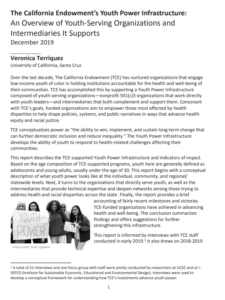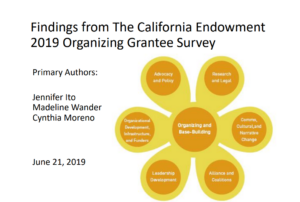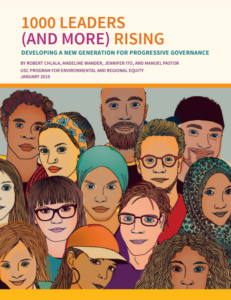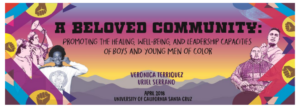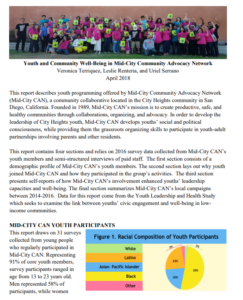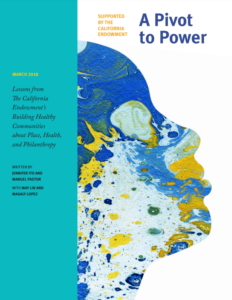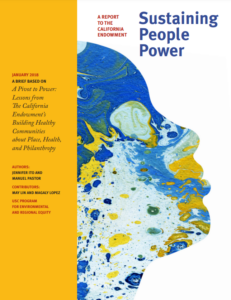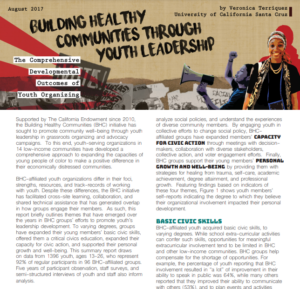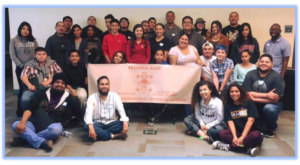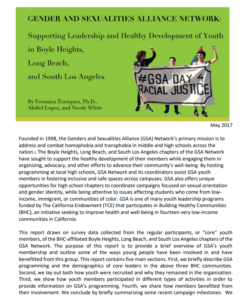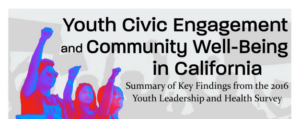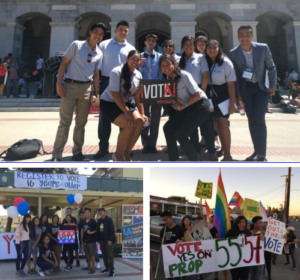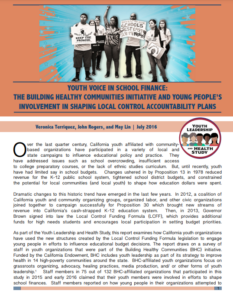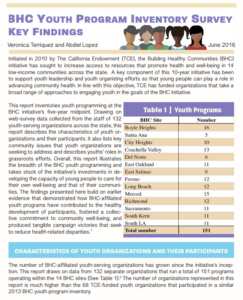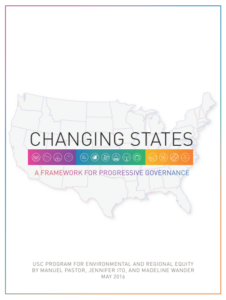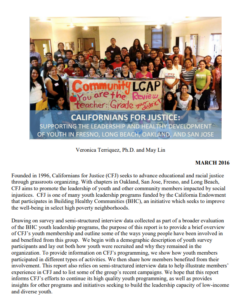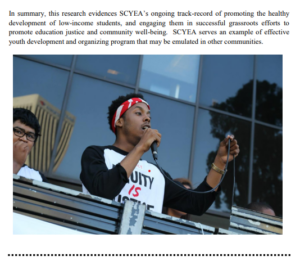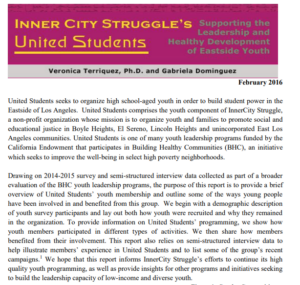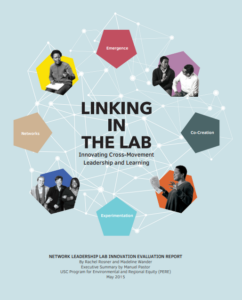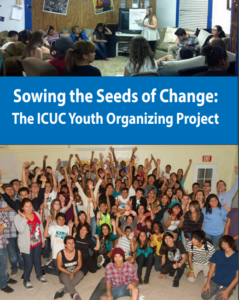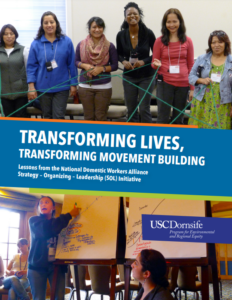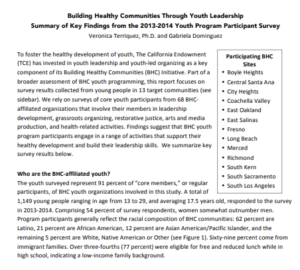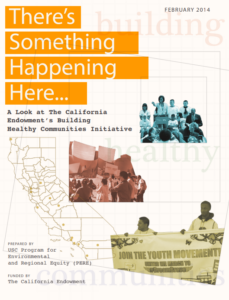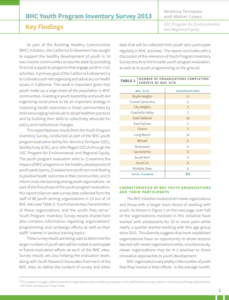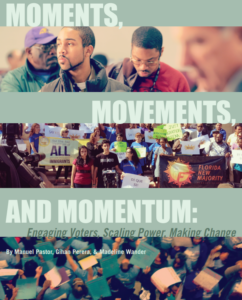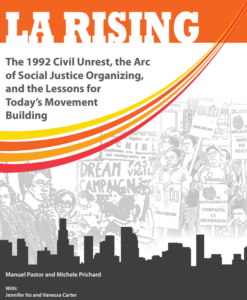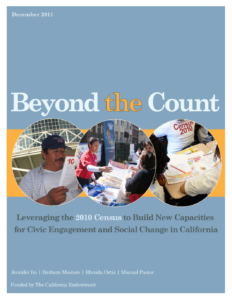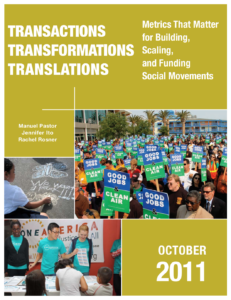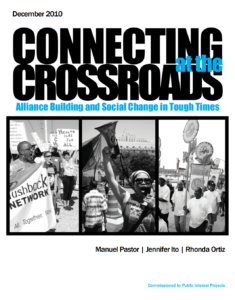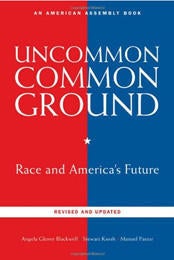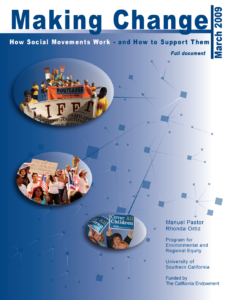Social Movements & Governing Power Reports
New publications
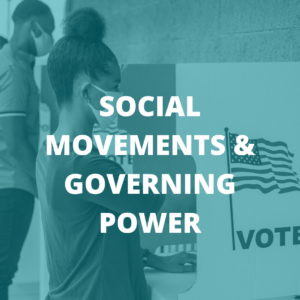
Recent reports (from 2020 to present)
Measuring What Matters for Our Transformation Towards a Healthy and Just California
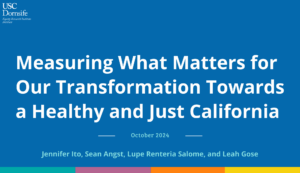
October 2024
By Jennifer Ito, Sean Angst, Lupe Renteria Salome, and Leah Gose
We offer this guide for movement builders and philanthropic allies who are looking for indicators to track changes, shifts, and transformations in California’s power-building infrastructure. It is based on developments in the power-building field in California, national reports on power-building metrics, and interviews with California-based advisors and partners. While there is a wide breadth of measures to collect and track, we focus on a specific set of strategies that power-building groups are deploying and evolving over the next decade—and thus shaping the types of learning and evaluative measures and indicators.
Catalyzing Community-Centered Redistricting for Racial Equity
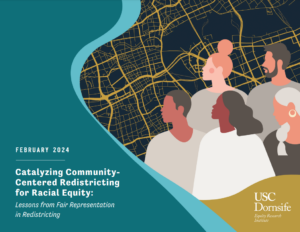
February 2024
By Jennifer Ito and Joanna Lee
Catalyzing Community-Centered Redistricting for Racial Equity: Lessons from Fair Representation in Redistricting is an important read for those who care about the future of our democracy—and want to find ways to get involved in redistricting. For the 2021-2022 redistricting cycle, a set of philanthropic leaders formed Fair Representation in Redistricting (FRR), a strategy to support historically excluded and under-represented communities to be active and influential players in advancing fair redistricting in states across the country. This report describes FRR strategies and core investments, highlights the successes and challenges of catalyzing a community-centered approach to redistricting, and offers recommendations for building on the momentum to shift the overall terrain upon which on-going fights are waged for racial equity, inclusive policies, and democratic participation.
Census 2020 in the San Joaquin Valley: An Empirical Assessment of Strategies to Activate Populations That Have Been Historically Undercounted
April 2023
By Joanna Lee and Jennifer Ito
Every ten years, every person in the United States is to be counted. Ensuring a complete and accurate count requires concerted effort and community investment to locate, equip, and persuade people who are less likely to participate in the census.
This report looks at the grassroots, community-driven outreach strategies implemented by The Center at Sierra Health Foundation’s funded community partners to increase participation in the census among communities in Southern San Joaquin Valley that have been historically undercounted. The study focuses on two outreach strategies: door-to-door canvassing and phone-banking. It finds that there were measurable improvements in self-response rates among census tracts that were canvassed and phone banked. It is likely that inequities in self-response rates would have been far greater without the highly intensive investments in community outreach. The study was commissioned by The Center at Sierra Health Foundation.
Looking Around The Corner: (Re)Imagining Power For A Healthy and Just California
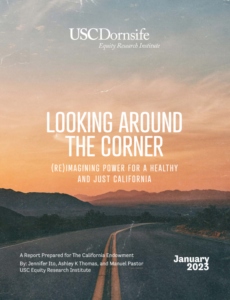 January 2023
January 2023
By Jennifer Ito, Ashley K. Thomas, and Manuel Pastor
Looking Around The Corner: (Re)Imagining Power For A Healthy and Just California is a forward-looking project to envision what we can collectively achieve if we invest in movements. Distilled from the wisdom of the field, the report offers a blueprint for where to invest over the next 10 years as activists, organizations, and funders collectively steer towards creating a different future.
Starting with a north star of governing power, the report outlines the need to re-envision our public institutions as being in service of communities and the new capacities needed to bring that into fruition. It takes an expansive view of how to wield that power, the structures to build connectivity and solidarity, and challenges for implementing and creating accountability. Looking Around The Corner combines soul and strategy, healing and action, vision and tactics to build a well-resourced, intersectional, and intersectoral ecosystem for power building.
 The Undermobilization of Young Voters in California: Tapping the Potential to Build Youth Political Power
The Undermobilization of Young Voters in California: Tapping the Potential to Build Youth Political Power
March 2022
By Veronica Terriquez and Josefina Flores Morales
Voter turnout during midterm elections is consistently much lower than turnout in a presidential election year, when the presidential race draws a lot of media attention. Participation in midterm elections tends to be especially low among young eligible voters. Although they have much at stake in congressional, state, and local elections, young adults may be less aware of the implications of election outcomes than their older counterparts. The next US midterm election, in November 2022, presents an opportunity to activate young adults who remain undermobilized. This report shows patterns of voter registration and turnout in California for eligible voters aged 18–34 in the 2018 midterm election. Results are disaggregated by county to inform efforts to register and educate young voters.
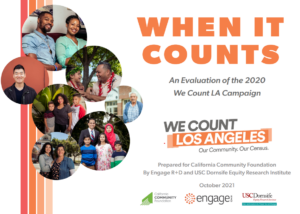 When it Counts: An Evaluation of the 2020 We Count LA Campaign
When it Counts: An Evaluation of the 2020 We Count LA Campaign
October 2021
Prepared for California Community Foundation
By Engage R+D and USC Dornsife Equity Research Institute
Los Angeles County has historically lagged behind the state in previous census counts not only as the nation’s most populous county but also due to the diversity of its population. This report highlights noteworthy attributes and assets of the We Count LA (WCLA) campaign that provide valuable insights for future census counts and large-scale civic engagement efforts. In fact, some of these lessons have already been applied to the state’s COVID rapid response and vaccination campaign. The WCLA campaign exemplifies the power of partnerships and a robust ecosystem of trusted messengers, community organizers, and networked allies to ensure those most at-risk of exclusion and the adverse impact of the pandemic are reached.
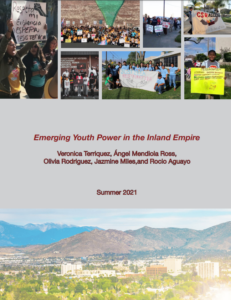 Emerging Youth Power in the Inland Empire
Emerging Youth Power in the Inland Empire
Summer 2021
By Veronica Terriquez, Ángel Mendiola Ross, Olivia Rodriguez, Jazmine Miles,and Rocio Aguayo
Youth organizations have long played a central role in promoting young people’s engagement in democratic processes. They can provide them with knowledge, skills, and developmental supports so that they can collectively exercise their voice and political power. Yet the civic infrastructure to support youths’ engagement in policy change and voter engagement efforts remains uneven across the state of California.
This report takes stock of emerging youth power in the Inland Empire by describing and contextualizing key youth-serving organizations. It begins with a historical overview of the two counties that make up the region (Riverside and San Bernardino), focusing on migration, exclusionary politics, and the political economy. After outlining the demographic composition of young people in the Inland Empire, we share an overview of youth programming. While the youth organizing infrastructure remains limited given the region’s population size, we note emerging patterns of youth leadership and power-building. Drawing on surveys and in-depth interviews, we discuss youths’ involvement in political campaigns, showing how these efforts develop their ability to lead ongoing civic action. Our report highlights an impressive increase in voter turnout, and notes that youth played an important role in making sure that their peers cast their ballot in 2020. At the same time, our research demonstrates the need to continue reaching out to emerging and young voters. The conclusion highlights the importance of ongoing investments in youth programming that supports young people’s abilities to become informed participants in community change efforts. This report includes an appendix listing some recent youth-led grassroots organizing campaign victories.
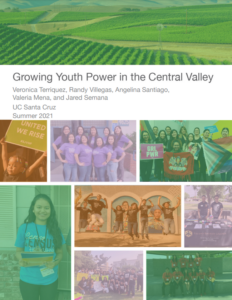 Growing Youth Power in the Central Valley
Growing Youth Power in the Central Valley
Summer 2021
By Veronica Terriquez, Randy Villegas, Angelina Santiago, Valeria Mena, and Jared Semana
This report takes stock of youth voice and power in the Central Valley. Drawing on surveys, 70 in-depth interviews with youth leaders, participant observations, and voting records, this report seeks to contextualize and provide an account of youth-serving organizations in the region. It begins with a historical overview of the Central Valley, with a focus on migration into the region, its exclusionary political history, and prior efforts to address social justice. After assessing the shared contributions of youth leadership and youth organizing groups, the report then features grassroots and civic engagement campaign efforts. The authors discuss youths’ involvement in these campaigns, showing how these efforts build young people’s ability to lead civic action. The report goes on to discuss the surge in voter turnout, and features some of the activities that groups have engaged in to grow the young electorate. At the same time, this research demonstrates the need for ongoing efforts to reach emerging and young voters. An appendix lists grassroots youth-led campaign wins.
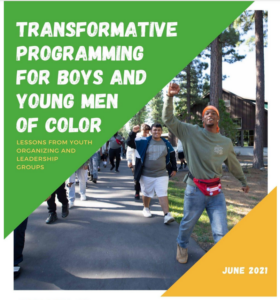 Transformative Programming for Boys and Young Men of Color: Lessons from Youth Organizing and Leadership Groups
Transformative Programming for Boys and Young Men of Color: Lessons from Youth Organizing and Leadership Groups
June 2021
By Uriel Serrano and Veronica Terriquez
Initiatives across the country have emerged to address “persistent opportunity gaps” that
contribute to the criminalization of boys and young men of color (BMOC), and to poor health outcomes in their communities. The California Endowment (TCE) has been a leader in responding to the challenges faced by this young population. Through focused investments in high-poverty communities, TCE has supported youth-serving organizations that help BMOC heal from trauma and hardship while equipping them to challenge the structural conditions that prevent them from thriving and achieving their goals.
This report draws on more than five years of research to highlight some promising practices for
engaging BMOC as leaders in their communities. Overall, this report seeks to inform
community-based efforts and investments that help BMOC to heal and thrive individually and
collectively while also giving them the tools to address systemic violence and injustice in their
communities.
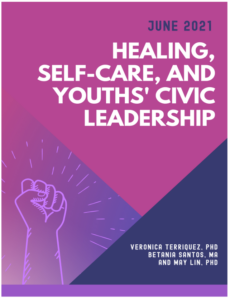 Healing, Self-Care, and Youths’ Civic Leadership
Healing, Self-Care, and Youths’ Civic Leadership
June 2021
By Veronica Terriquez, Betania Santos, and May Lin
In the past decade, a growing number of youth organizing and leadership groups have engaged low-income youth of color to address social disparities through grassroots organizing, advocacy, and public education. Many youth organizing groups across the state have increasingly incorporated healing and self-care practices to promote the well-being of their members as they work toward positive community change. These self-care practices aim to address some of the emotional trauma, stress, and other challenges that contribute to poor mental health among young people of color. Groups’ efforts often reflect a recognition of how social inequalities negatively impact mental health outcomes for young people, as well as a concern that engaging in grassroots organizing or other efforts to improve community conditions can actually exacerbate emotional stress. As such, organizations have sought to incorporate activities that alleviate negative mental health outcomes while at the same time empowering their members to create positive social change. Summarizing findings from surveys, focus groups, 180 in-depth interviews with youth leaders, and over three years of participant observations, this report shows how and to what extent TCE-supported youth organizations across California engage their members in a range of healing and self-care practices. It also explores how these healing practices are associated with an array of self-reported leadership, health, and other developmental outcomes.
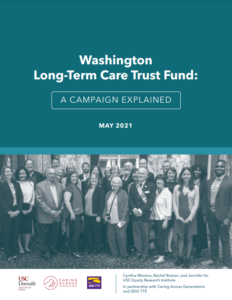 Washington Long-Term Care Trust Fund: A Campaign Explained
Washington Long-Term Care Trust Fund: A Campaign Explained
May 2021
By Cynthia Moreno, Rachel Rosner, and Jennifer Ito, USC Equity Research Institute in partnership with Caring Across Generations and SEIU 775
The passage of the Long-Term Care (LTC) Trust Act led by Washingtonians for a Responsible Future (WRF) gives hope to families struggling to afford to care for their loved ones. This impressive 2019 legislative win provides the nation a vision of what is possible when a dedicated group of stakeholders achieves meaningful change for those in need of long-term care support and services as it is the nation’s first publicly funded long-term care insurance program. This report shares insights and lessons from Washington with those interested in long-term, sustainable, and publicly funded and operated solutions in their own state.
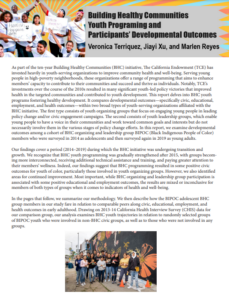 Building Healthy Communities Youth Programming and Participants’ Developmental Outcomes
Building Healthy Communities Youth Programming and Participants’ Developmental Outcomes
2021
By Veronica Terriquez, Jiayi Xu, and Marlen Reyes
As part of the ten-year Building Healthy Communities (BHC) initiative, The California Endowment (TCE) has invested heavily in youth-serving organizations to improve community health and well-being. Serving young people in high-poverty neighborhoods, these organizations offer a range of programming that aims to enhance members’ capacity to contribute to their communities and succeed and thrive as individuals. Notably, TCE’s investments over the course of the 2010s resulted in many significant youth-led policy victories that improved health in the targeted communities and contributed to youth development. This report delves into BHC youth programs fostering healthy development.
It compares developmental outcomes—specifically civic, educational, employment, and health outcomes—within two broad types of youth-serving organizations affiliated with the BHC initiative. The first type consists of youth organizing groups that focus on engaging young people in leading policy change and/or civic engagement campaigns. The second consists of youth leadership groups, which enable young people to have a voice in their communities and work toward common goals and interests but do not necessarily involve them in the various stages of policy change efforts. In this report, we examine developmental outcomes among a cohort of BHC organizing and leadership group BIPOC (Black Indigenous People of Color) members who were surveyed in 2014 as adolescents and then surveyed again in 2019 as young adults.
Building a Statewide Youth Movement and YO! California’s 2019 Emerging Organizers Fellowship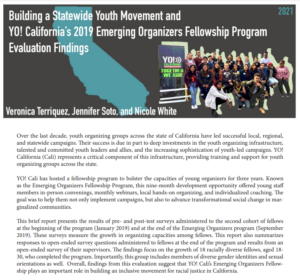
2021
By Veronica Terriquez, Jennifer Soto, and Nicole White
Over the last decade, youth organizing groups across the state of California have led successful local, regional, and statewide campaigns. Their success is due in part to deep investments in the youth organizing infrastructure, talented and committed youth leaders and allies, and the increasing sophistication of youth-led campaigns. YO! California (Cali) represents a critical component of this infrastructure, providing training and support for youth organizing groups across the state.
YO! Cali has hosted a fellowship program to bolster the capacities of young organizers for three years. Known as the Emerging Organizers Fellowship Program, this nine-month development opportunity offered young staff members in-person convenings, monthly webinars, local hands-on organizing, and individualized coaching. The goal was to help them not only implement campaigns, but also to advance transformational social change in marginalized communities.
This brief report presents the results of pre- and post-test surveys administered to the second cohort of fellows at the beginning of the program (January 2019) and at the end of the Emerging Organizers program (September 2019). These surveys measure the growth in organizing capacities among fellows. This report also summarizes responses to open-ended survey questions administered to fellows at the end of the program and results from an open-ended survey of their supervisors. The findings focus on the growth of 18 racially diverse fellows, aged 18-30, who completed the program. Importantly, this group includes members of diverse gender identities and sexual orientations as well. Overall, findings from this evaluation suggest that YO! Cali’s Emerging Organizers Fellowship plays an important role in building an inclusive movement for racial justice in California.
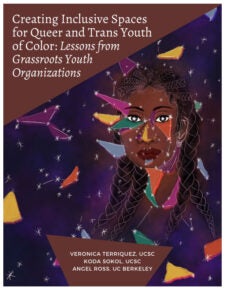 Creating Inclusive Spaces for Queer and Trans Youth of Color: Lessons Learned from Grassroots Youth Organizations
Creating Inclusive Spaces for Queer and Trans Youth of Color: Lessons Learned from Grassroots Youth Organizations
February 2021
By Veronica Terriquez (UCSC), Koda Sokol (UCSC), and Angel Ross (UC Berkeley)
Queer and Trans Black, Indigenous, and People of Color (QTBIPOC) are well-represented in California’s youth organizing groups, serving at the forefront of campaigns for educational equity, environmental justice, health equity, immigrant rights, racial justice, and other issues affecting low-income and marginalized communities. This report details how grassroots youth organizing groups can create inclusive spaces for young QTBIPOC to lead and be heard, even when their campaign work may not necessarily focus on addressing gender and sexuality issues.
 Indigenous Youth Leadership: Themes and Questions to Consider
Indigenous Youth Leadership: Themes and Questions to Consider
October 2020
By Dr. Yvonne Sherwood & Dr. Veronica Terriquez
This brief report highlights findings from interviews with five organizations that serve Native youth in California. It highlights four key themes that emerged from interviews that can inform planning for future investments in youth organizing serving Native and Indigenous youth: (1) Indigeneity as an inclusive definition of Native youth; (2) the significance of cultural revitalization; (3) geographic dispersion and digital infrastructure; (4) the role of government agencies in providing an institutional footprint and recruitment platform.
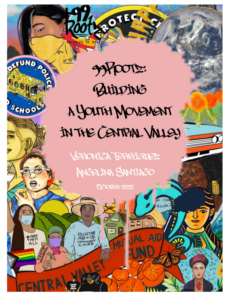 99Rootz: Building a Youth Movement in the Central Valley
99Rootz: Building a Youth Movement in the Central Valley
October 2020
By Veronica Terriquez and Angelina Santiago
This research draws on surveys, interviews, and voting records to describe how 99Rootz civically empowers its youth members to lead grassroots campaigns and effectively mobilize young Central Valley voters.
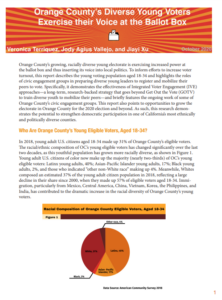 Orange County’s Diverse Young Voters Exercise their Voice at the Ballot Box
Orange County’s Diverse Young Voters Exercise their Voice at the Ballot Box
October 2020
By Veronica Terriquez, Jody Agius Vallejo, and Jiayi Xu
Orange County’s growing, racially diverse young electorate is exercising increased power at the ballot box and thus inserting its voice into local politics. To inform efforts to increase voter turnout, this report describes the young voting population aged 18-34 and highlights the roles of civic engagement groups in preparing diverse young leaders to register and mobilize their peers to vote. While featuring the ongoing work of Power California and some of Orange County’s civic engagement groups, this report also points to opportunities to grow the electorate in Orange County for the 2020 election and beyond. As such, this research demonstrates the potential to strengthen democratic participation in one of California’s most ethnically and politically diverse counties.
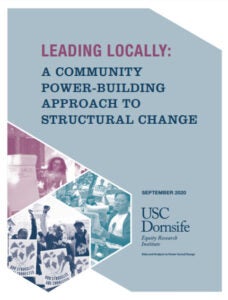 Leading Locally: A Community Power-Building Approach to Structural Change
Leading Locally: A Community Power-Building Approach to Structural Change
September 2020
By Manuel Pastor, Jennifer Ito, and Madeline Wander
Lead Local was a collaborative research project bringing together well-respected local power-building leaders in the fields of community organizing, advocacy, and research.
From 2018 to 2020, Lead Local sought to answer the question: How does community power catalyze, create and sustain conditions for healthy communities? This set of reports include a summary, a full report, and a brief.
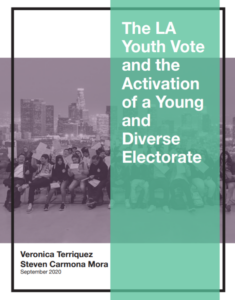 The LA Youth Vote and the Activation of a Young and Diverse Electorate
The LA Youth Vote and the Activation of a Young and Diverse Electorate
September 2020
By Veronica Terriquez and Steven Carmona Mora
Between the 2014 and 2018 elections, Los Angeles County experienced a fourfold increase in turnout among the youngest voters, those aged 18-24. National political dynamics and youth-led calls to mobilize in response to gun violence undoubtedly contributed to this upsurge in youth electoral participation. However, the extraordinary increase in turnout in Los Angeles county can also be attributed partly to the LA Youth Vote, a multi-sector collaboration that centered youth leadership in registering, educating, and mobilizing young voters. Initially launched by the United Way of Greater Los Angeles and currently spearheaded by the Power California youth civic engagement network, the LA Youth Vote is further supported by grassroots youth organizing groups, the County Board of Registrars, the State Secretary of State, the Los Angeles Unified School District, individual principals and teachers, and philanthropic organizations. The initiative represents a model for how agencies can work together to promote young and racially diverse residents’ informed engagement in government elections.
PERE Social Movements & Governing Power reports (2008 to 2019)
From 2008 to early 2020, USC ERI published social movement and governing power reports under our previous name, the USC Program for Environmental and Regional Equity (PERE). These publications are listed below in reverse chronological order.
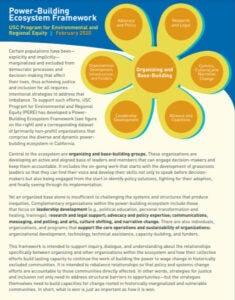 Power-Building Ecosystem Framework
Power-Building Ecosystem Framework
February 2020
By USC Program for Environmental and Regional Equity (PERE) – Jennifer Ito, Madeline Wander, and Cynthia Moreno
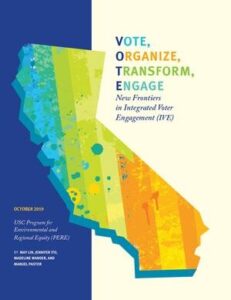 Vote, Organize, Transform, Engage (VOTE): New Frontiers in Integrated Voter Engagement
Vote, Organize, Transform, Engage (VOTE): New Frontiers in Integrated Voter Engagement
October 2019
By USC Program for Environmental and Regional Equity (PERE) – May Lin, Jennifer Ito, Madeline Wander, and Manuel Pastor
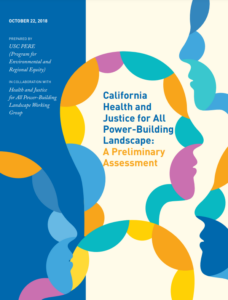 California Health and Justice for All Power-Building Landscape: Defining the Ecosystem
California Health and Justice for All Power-Building Landscape: Defining the Ecosystem
October 15, 2019
Prepared by USC PERE (Program for Environmental and Regional Equity) in Collaboration with: Health and Justice for All Power-Building Landscape Working Group
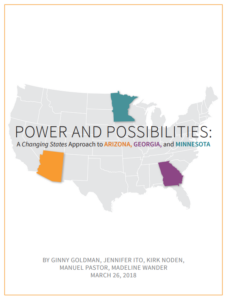 Power and Possibilities: A Changing States Approach to Arizona, Georgia, and Minnesota
Power and Possibilities: A Changing States Approach to Arizona, Georgia, and Minnesota
March 2018
By Jinny Goldman, Jennifer Ito, Kirk Noden, Manuel Pastor, and Madeline Wander
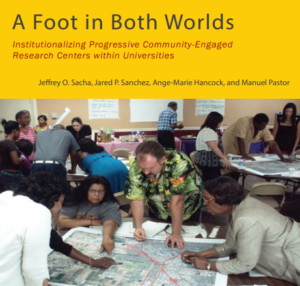 A Foot in Both Worlds: Institutionalizing Progressive Community-Engaged Research Centers within Universities
A Foot in Both Worlds: Institutionalizing Progressive Community-Engaged Research Centers within Universities
December 2013
By Jeffrey O. Sacha, Jared P. Sanchez, Ange-Marie Hancock, and Manuel Pastor
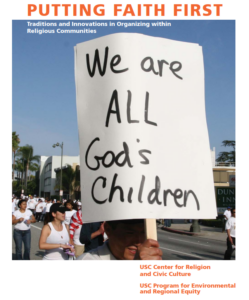 Putting Faith First: Traditions and Innovations in Organizing within Religious Communities
Putting Faith First: Traditions and Innovations in Organizing within Religious Communities
April 2012
By the USC Center for Religion and Civic Culture and the USC Program for Environmental and Regional Equity
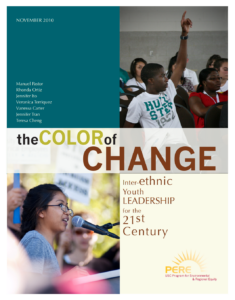 The Color of Change: Inter-ethnic Youth Leadership for the 21st Century
The Color of Change: Inter-ethnic Youth Leadership for the 21st Century
November 2010
By Manuel Pastor, Rhonda Ortiz, Jennifer Ito, Veronica Terriquez, Vanessa Carter, Jennifer Tran, and Teresa Cheng

